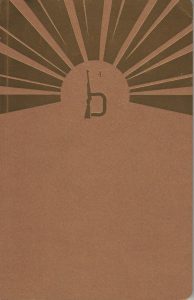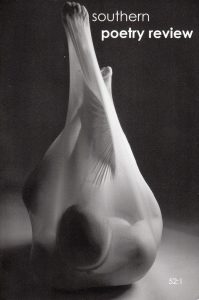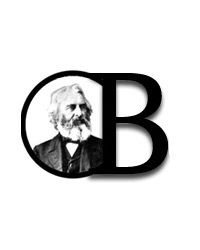Notes on AWP :: My Panel Presentation
I’ve “presented” at conferences before, but nothing as large as AWP. Granted, the attendance size per session isn’t any more than what I have faced before, and in some cases, smaller, but – IT’S THE AWP for cripesake! My name is indexed in the program and I get a bio! Hey, I’m just small town, Midwestern gal. I mean, I saved a copy to send home to my parents. I’m sure they’ll find a way to hang it on the refrigerator.
The panel, put together and moderated by fearless leader and Chattahoochee Review Editor, Marc Fitten, was titled “Bye Bye Boomers: Shifting to the Post-Literate World.” The program description: “With baby boomers heading into the sunset and younger generations beginning to establish themselves, a tremendous generation shift has taken place in language, literature, and publishing. What can artists, editors, and publishers do to acknowledge that rift and ensure the relevance of literary publishing?” Sounds vague enough to invite a varied panel.
Those of us on the panel never spoke to one another before we met that day, at the panel, so it had to be that Marc had a master plan of how we all fit together, and, I can say with certainty, he did very well.
As best as I can recall from the presentations (as best because of a) my nervousness and b) a poorly timed fire alarm) here is what took place.
The session was actually well attended. I would say at least forty people, maybe fifty, and the audience was a good mix of participants in terms of age, though I would say there were more “older” people there than younger.
Marc introduced the discussion and posed several questions to get the panelist started. Marc asked David Lynn, Editor of The Kenyon Review to start us off. David talked about the long history of The Kenyon Review, and about the sort of steadfastness of the print publication, but at the same time, the flexibility the publication has shown over the years to remain current. The Kenyon Review also has a web presence, which offers its readers content they cannot get in the print publication, such as the blog, interviews, readings and podcasts.
Lynn’s comments were poignant on the need for publications to find ways to keep themselves current while maintaining their traditions. It’s almost becoming essential that if lit mags want to reach out to a broader audience, and in some cases – survive – they need to have a web presence. NewPages only lists one magazine (that I know of) that doesn’t have its own web site; the sponsored listing on NewPages is the only web presence this publication has. Considering what NewPages does, we can’t list publications that don’t have web sites, because we can’t link to anything! But a sponsored listing can certainly offer some web presence.
Thanks to the recent postal hike, some magazines find themselves forced to shift their publication to online only. This may or may not work. Certainly, there is less cost in publishing online, but there is still cost involved – including a lot more time for the ongoing maintenance a site demands (trust me on this one). And publishing online it is a whole different beast. Not everything that works on a print page can work online. And not every writer who would be honored to have their work accepted for a paper publication is even interested in considering online publications. The stigma still exists for some writers as well as readers.
Again, NewPages has attempted to address this issue by being select in the publications that are listed in our guide to online mags (lit and alternative). It’s not always an easy discernment, but in most cases it is. You may recall this: “We’ve all heard that a million monkeys banging on a million typewriters will eventually reproduce the entire works of Shakespeare. Now, thanks to the Internet, we know this is not true.“ (Often credited to Prof. Robert Silensky, California University.) The Internet has indeed become the quintessential Brautigan Library (The Abortion). And, like that library, much of the content is relegated to the caverns. So what’s a reader to do? Turn to their trusted “filters,” like NewPages. We’ve been accused of “censorship” for limiting our lists. I guess that’s a claim we’ll own if what it means is we have standards that include quality content and consistent cycles of publication.
After David Lynn, Marc moved the discussion in the direction of what a community of writers is to do about reaching out to its readers. On this, NEA Director of Literature David Kipen spoke about The Big Read. From the NEA Web site: “The Big Read is an initiative of the National Endowment for the Arts designed to restore reading to the center of American culture. [. . .] The Big Read provides citizens with the opportunity to read and discuss a single book within their communities. This initiative comprises innovative reading programs in selected communities; expansive outreach and publicity campaigns, including television, radio, and print publicity; compelling resources for discussing outstanding literature; and an extensive Web site offering comprehensive information on the authors and their works.” Kipen explained this to the audience, and spoke, not so much on the importance of creating a community of reading, which The Big Read certainly does, but about how involved and excited kids are – *still are* – about reading books, and how The Big Read encourages this kind of excitement with reading. Even in a “post literate”society.
Next up on the panel – me. My presentation came from my two roles: as a teacher of reading and writing, and as an editor with NewPages. I started my presentation by mentioning Ursula K. Le Guin’s recent article in the February issue of Harper’s Magazine: “Staying awake: Notes on the alleged decline of reading.” In it, she discusses how reading was a form of social currency. I took this concept and applied it to the current generation, in which this social currency has become whatever is the newest form of technology. It’s not so much the gadgets or the tools that are the currency, but the knowledge of how to access them and use them to achieve an end goal. I gave the example of my father, who, when he first sat down at the computer to see the Internet, then looked at me and said, “Now what?” vs. a generation that has grown up never not knowing what the technology that surrounds them can do.
The issue, for me as a teacher, is, if technology is the social currency, just as reading was (and still is), then who is to teach the value of this currency to the younger generation? If it cannot be older adults like my father, then from whom? As a teacher, I try to stay as current in as much applicable technology as possible, and I try to show students how technology can be used for educational gain. It used to be that education would ruin the fun of technology – we took e-mail, which used to belong to the younger generation, and made it a work tool. Now kids hardly use it – it’s archaic to them, but essential for us professionals. This isn’t the case with newer technologies, which teachers are using in their classrooms with students – like iTunes for listening to podcasts; YouTube for videos to supplement class content; class wikis in which students create the content, which is then used by subsequent classes as their text; classes taught completely online; allowing students to submit video projects for the same assignment that another student may opt to complete a traditional research paper. These are just a few of the ways technology can become social currency in the educational sphere, and how a different value of this social currency can be taught to the younger generation.
Additionally, I commented on the state of reading and books only briefly, as this seemed a whole different conversation. But I did mention Sven Birkerts essay: “The Fate of the Book,” which is in the book he edited: Tolstoy’s Dictaphone: Technology and the Muse. Published by Graywolf Press in 1996, the essay could just as easily have been written yesterday for the applicability it holds. And, I commented, I don’t know that Birkerts was attempting to predict anything with his essay so much as to simply comment on what he saw taking place around him and to open this contemplation up for further consideration and discussion. There are no answers in his reflections, but the start to an observant dialogue which we continue to this day. It is an essay I highly recommend for those who have not read it.
Just following my presentation, as luck would have it, and thanks to a torrential downpour taking place outside, the hotel fire alarm was triggered. About two-thirds of the audience went directly for the door – either they were native New Yorkers who took fire alarms seriously, or they had heard enough. I’m guessing the latter. In any case, the panelists stuck it out – Marc assuring us that, for some reason in his store of trivia, he knew that heavy rain set off fire alarms.
The remainder of the panel was short, interrupted at least twice more by the alarm, and several times by the hotel PA system. Brigid Hughes, editor of A Public Space magazine spoke briefly on the state of publishing new voices, more global voices, and looking at new forms of writing, including new literary styles emerging from Japanese writers (I don’t recall what issue of APS she mentioned specifically for this – but contact her about it if you’re interested).
Andrew Day, co-publisher of Failbetter, an online quarterly that publishes original works of fiction, poetry and art, discussed the creation and maintenance of a completely online publication. Both Brigid and Andrew did well in the follow-up discussion when questions arose regarding online vs. paper by saying there was no “vs.” in their opinion, that each are distinct forms of publication, one not meaning to take over the other, but coexisting. When asked about why read Hamlet online instead of in print, Brigid said, “No. Both. Read it online and in print.” And further commented how this wasn’t so different from how teachers have students read the play and then watch the movie or a production of the play. They are different forms all meant to help the reader access the material.
One audience member, who mentioned some role she had with AARP, started her comment by saying how she didn’t like the presentation of an us vs. them when looking at the generations, and specifically mentioned the comment I made about my father. She went on to talk about how AARP is offering social networking tools – similar to those used by the younger generation – to create online communities for themselves, and how many older adults (Boomers?) are using technology to stay connected in ways previous generations had not. So, rather than being “shut in,” which some elder adults are, they can actually have regular social contact with others via the Web and other technologies.
I appreciated her comments about what AARP is doing to support older adults, but I think she mistook the comment I made about my father by thinking I was pitting generations against one another. Quite the opposite, in fact, and as these new social networking enhancements by the AARP show. If anything, more than any generations before us, the younger generation has a stronghold on the social currency that is technology – in terms of knowing their way around it. It used to be that when I went to visit my parents, I would set the clock on the VCR for them. Now, it’s helping them clean up all the programs their grandkids have downloaded onto their computer and updating the virus check software. No, it’s not that the older generation isn’t using the technology at all or has no concept as to what to do with it, but it is the younger generation that is teaching them about it. And it’s absolutely fascinating to see, because the younger generation is very willing to do this. When I was frustrated with trying to figure out how to pimp my MySpace page, I went into my classroom, opened up my page on the overhead, and said to my class – “Teach me how to pimp my page.” And they did. They opened up their own accounts in the classroom, showed one another, had to explain basic and complex steps to me, had to answer my questions, had to give me advice on what not to do, etc. It was a great community-building experience, and an example I drew on for the class several times when talking about subject, purpose and audience in writing, tone and manner, authority, voice, style, process analysis – you name it. They taught me and we all learned together. In what generation have we seen so much of this?
My father, by the way, is not a boomer. He’s a WWII generation, and still doesn’t have much use for the Internet, other than to read an occasional e-mail and look at pictures of his children, grandchildren, and great grandchildren. If anything, he reminds me of my own “pre-Internet” days. I wonder how I came this far this quickly, how much more there is I could know and use when it comes to technology, and if it’s all really worth it or necessary. There are those moments when I imagine myself in the forest, in a small cabin by a river, a hand pump in the sink for water, a wood stove for heat, and a wall of books to read. Okay, maybe propane heat and plumbing.
At both the fire alarm break and at the close of the panel, I was flocked by audience members who wanted to talk teaching. A number of them were the older adults I had seen in the audience, and they expressed their concern about not knowing a whole lot about new technologies (Several asked about wikis – of the number of free-source wikis I’ve looked at, I like wikispaces for least intrusive ads; I know many educators prefer PB Wiki, and there >WetPaint, which I can’t stand becuase of the intrusive ads.). But they also were eager – even if openly nervous – about using technology they knew so little about in the classroom and in their teaching. My advice? Try it, play with it, have fun with it. Ask your students for help, or ask them to play around with it and tell you what can be done with it. Their fearlessness and ingenuity with this social currency combined with a teacher’s content knowledge can make for some very exciting new pedagogy. And, really, with new technology cropping up so quickly, it’s never too late to jump in, because each day there is something new to try, and the spectrum from basic to advanced allows for all kinds of possibilities. You just gotta wanna try it.
My thanks to Marc, David L., David K., Brigid, Andy, and all the audience members pre- and post-alarm.




